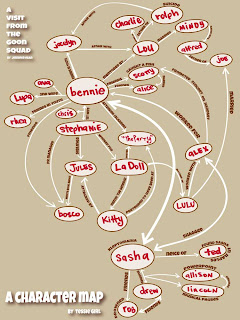Engender
Another subject in writing that can be as imagination destroying as the technique of characters describing themselves through a mirror is the idea that you can't write outside your gender. This would also extend to ethnicity, class and species - if Orwell can put himself in the head of talking animals, why should it be impossible for a woman to do so with a man? Or vice versa?
I see warnings against this every so often. There was a little bit of this when 'The Help' came out (the book), and some reviewers expressed concern with the author writing in the voice and from the perspective of a black woman.
A failure to place yourself as a writer in the mind of someone utterly apart from you in background or biology is a failure of imagination.
There is a great deal of risk in doing so. Failing to capture the voice and perspective accurately can lead to disaster - especially if your effort comes off as caraciture. In my story 'The Decedents,' which will appear in my forthcoming story collection, the main character is an African-American teenage girl living in a poverty-stricken neighborhood. I live in this same type of neighborhood, and have such girls for my neighbors. I ride the bus with them every day. My goal was to listen and observe and imagine their world, as best as I could. It never occured to me not to; it occured to me that someone somewhere would call me out for doing so, regardless of whether I did it well or not.
You can't concern yourself with this.
The effort of the writer is always going to be twofold: 1) to investigate and report an unknown world, character and story to a reader and 2) to allow that reader to then put themselves in that world in a way that is seamless and dreamlike. Placing any restrictions on where a writer or reader can go with their imagination is no different than some government official in China saying where his people can go on the internet. Google the people that live on the other side of town. Google your crazy little sister. Listen to the way people from vastly different backgrounds talk - write it down. Learn the music. You can learn a song - some of you can play it - you have put yourself in an experience that was not yours before and made it yours. Writing from the perspective of a black woman in Mississippi is no different. Your success will vary. Your effort should never - listen. Imagine.
I see warnings against this every so often. There was a little bit of this when 'The Help' came out (the book), and some reviewers expressed concern with the author writing in the voice and from the perspective of a black woman.
A failure to place yourself as a writer in the mind of someone utterly apart from you in background or biology is a failure of imagination.
There is a great deal of risk in doing so. Failing to capture the voice and perspective accurately can lead to disaster - especially if your effort comes off as caraciture. In my story 'The Decedents,' which will appear in my forthcoming story collection, the main character is an African-American teenage girl living in a poverty-stricken neighborhood. I live in this same type of neighborhood, and have such girls for my neighbors. I ride the bus with them every day. My goal was to listen and observe and imagine their world, as best as I could. It never occured to me not to; it occured to me that someone somewhere would call me out for doing so, regardless of whether I did it well or not.
You can't concern yourself with this.
The effort of the writer is always going to be twofold: 1) to investigate and report an unknown world, character and story to a reader and 2) to allow that reader to then put themselves in that world in a way that is seamless and dreamlike. Placing any restrictions on where a writer or reader can go with their imagination is no different than some government official in China saying where his people can go on the internet. Google the people that live on the other side of town. Google your crazy little sister. Listen to the way people from vastly different backgrounds talk - write it down. Learn the music. You can learn a song - some of you can play it - you have put yourself in an experience that was not yours before and made it yours. Writing from the perspective of a black woman in Mississippi is no different. Your success will vary. Your effort should never - listen. Imagine.


Comments